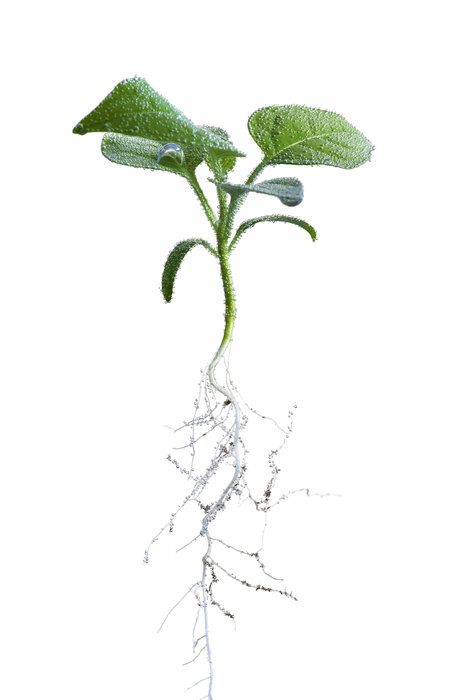Extreme weather phenomena are on the rise worldwide, including frequent droughts and fires. Floods are also a clear consequence of climate change. For agriculture, a flooded field means major losses: about 15 percent of global crop losses are due to flooding. As part of a collaboration between Freiburg, Utrecht in the Netherlands, and other institutes, Junior Professor Dr. Sjon Hartman from the Cluster of Excellence CIBSS – Centre for Integrative Biological Signalling Studies at the University of Freiburg, has now discovered that a signaling molecule can make plants more resistant to flooding. The gaseous plant hormone ethylene causes the plant to switch on a kind of molecular emergency power system that helps it survive the lack of oxygen during flooding. The team had previously demonstrated that ethylene sends a signal to the plant that it is underwater. Pretreating the experimental plants with the hormone improved their chances of survival. The results, which appeared in the journal Plant Physiology, should help to combat waterlogging and flooding in agriculture and, for example, to develop resistant plant varieties.

Credit: Iris Hartman / University of Freiburg
Extreme weather phenomena are on the rise worldwide, including frequent droughts and fires. Floods are also a clear consequence of climate change. For agriculture, a flooded field means major losses: about 15 percent of global crop losses are due to flooding. As part of a collaboration between Freiburg, Utrecht in the Netherlands, and other institutes, Junior Professor Dr. Sjon Hartman from the Cluster of Excellence CIBSS – Centre for Integrative Biological Signalling Studies at the University of Freiburg, has now discovered that a signaling molecule can make plants more resistant to flooding. The gaseous plant hormone ethylene causes the plant to switch on a kind of molecular emergency power system that helps it survive the lack of oxygen during flooding. The team had previously demonstrated that ethylene sends a signal to the plant that it is underwater. Pretreating the experimental plants with the hormone improved their chances of survival. The results, which appeared in the journal Plant Physiology, should help to combat waterlogging and flooding in agriculture and, for example, to develop resistant plant varieties.
Tracking the adaptations to wet conditions
Plant species differ greatly in their ability to survive periods of flooding or waterlogging. “In the case of potatoes, the roots die after two days due to a lack of oxygen. Rice plants are much more resistant, able to survive their entire lives in waterlogged paddy fields,” Hartman explains. The Arabidopsis thaliana, a model organism for plant research, can be used to study the genes and proteins that make up this adaptation. “Plants notice that they are surrounded by water because the gas ethylene, which all plant cells produce, can no longer escape into the air,” Hartman continues. The researchers showed this in previous studies at Utrecht University. Receptors throughout the plant subsequently respond to increased concentrations of the hormone.
Simulate flooding with oxygen deprivation
The team simulated flooding by placing Arabidopsis seedlings in a bell jar without light or oxygen. When the seedlings were previously exposed to ethylene gas, the root tip cells survived longer. The treated plants stopped root growth and switched energy production in the cells to oxygen-free metabolic processes. In addition, the ethylene caused the cells to be better protected against harmful oxygen radicals that accumulate in oxygen-deprived plants. This was revealed by analyses of gene activity and protein composition of the cells.
“Taken together, these rearrangements that ethylene triggers improve plant survival during and after flooding,” Hartman summarizes. “As we better understand these signaling pathways, we can learn to make crops more resilient to flooding to combat climate change.”
Read more about Jun.-Prof. Dr. Sjon Hartman’s research at CIBSS:
https://www.cibss.uni-freiburg.de/de/news/he-is-getting-to-the-root-of-plant-memory-2
###
About the Cluster of Excellence CIBSS
The Cluster of Excellence CIBSS – Centre for Integrative Biological Signalling Studies aims to gain a comprehensive understanding of biological signaling processes across scales – from the interactions of single molecules and cells to the processes in organs and whole organisms. The researchers are using the knowledge they have gained to develop strategies that can be used to control signals in a targeted manner. Thanks to these technologies, they not only able to unlock new insights in research, but also enable innovations in medicine and plant sciences.
Overview of facts:
- Original publication: Liu, Z., Hartman, S., van Veen, H., Zhang, H., Leeggangers, H., Martopawiro, S., Bosman, F., de Deugd, F., Su, P., Hummel, M., Rankenberg, T., Hassall, K., Bailey-Serres, J., Theodoulou, F., Voesenek, L., Sasidharan, R. (2022): Ethylene augments root hypoxia tolerance via growth cessation and reactive oxygen species amelioration, Plant Physiology, 2022, kiac245, https://doi.org/10.1093/plphys/kiac245
- Sjon Hartman has been Junior Professor for “Plant Environmental Signalling and Development” at the University of Freiburg since 2022 and is a member of the Cluster of Excellence CIBSS – Centre for Integrative Biological Signalling Studies.
- Hartman researches the biological signaling processes that enable plants to respond to their environment and adapt to changing conditions. https://www.hartman-plantlab.com/
Journal
PLANT PHYSIOLOGY
DOI
10.1093/plphys/kiac245
Subject of Research
Cells
Article Title
Ethylene augments root hypoxia tolerance via growth cessation and reactive oxygen species amelioration
Article Publication Date
30-May-2022




